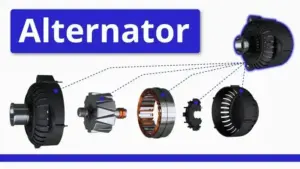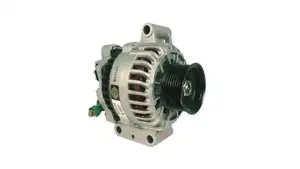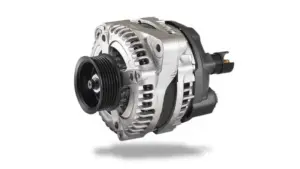Introduction
Are you experiencing alternator issues and feeling overwhelmed by the complex market offerings?
Do you need clarification about what kind of alternator you need or where to buy it? Say goodbye to confusion! Struggling to choose the right alternator?
Our guide simplifies the process! Learn key factors that determine the perfect alternator for your vehicle.
What Does an Alternator Do?

What makes the car’s electrical system work has always bothered you? This valuable tool is the essential component of the alternator for the battery. That will energise every item, from lights to radios.
Think of it like a device that generates electricity:
Your alternator supplier converts that mechanical energy into electricity. It operates as the engine spins. The electricity flows back to the battery, keeping it completely charged and cut for any road.
But how does it work? The alternator uses the principle of electromagnetic induction. Where spinning magnets in the rotor generate an electric charge. This current is up to 13–14.8 volts of safe voltage to keep your battery and electronics happy.
Here’s what makes up this essential component:
- Line filter: Cleans economic power from feed-in electricity
- Stator diode: Converts AC electricity to DC electricity that your car can consume.
- Converter: Controls the voltage in your system so that everything is safe.
- Rotor: Their central part that generates the magic magic.
- Cooling fans: Keep the images from going overheating.
And the best part? The alternator operates with the involvement of other vehicle systems. Works by connecting it to the engine through the serpentine belt.
It is why you will remember the alternator the next time you start your vehicle. Hidding but working inaudible to ensure your electrical system is well functioning!
Types Of Alternators
The alternators have separate types. Explore the two main types: high-output alternators and classical alternators. Study the unique features, benefits, and applications. That can represent the best option for each vehicle.
According to Electrical Output
● High-Output Alternators
New, efficient, and powerful alternators deliver peak charging performance. Which makes for electrical systems with high amperage requirements. These best alternator brands produce 200 amps with the utmost ease. Guaranteeing that the battery will recharge as fast as possible.
Brushless technology has enabled them. It requires explicit maintenance to offer higher durability and longevity. Recent cars with advanced audio systems need high amperages, which these alternators provide. Starting at 130 amps and rising to 220 amps. Additionally, they propel a high demand for electrical accessories within the engine.

● Regular Alternators:
The torque needs to be higher in both. The traditional versions of alternators and the ones with carbon breaks. They often show a lower power output with increased speed and a shorter life expectancy. The stress is on the regular reactive brushes used by alternators. Wears them out, which could lead them to heat up.
Besides, these AC and DC alternators supply electrical power enough for car systems. This type of equipment comes as a standard.
Comparison
New Vs. Remanufactured Alternators
If a new alternator needs replacing, you have two options: buy a new one or a remanufactured one.
- New Alternators:
The specifications of OE (original equipment) make the new alternators. New alternators include all-new parts free of wear and tear.
- Remanufactured Alternators:
Remanufactured alternators are rebuilt using new parts. Offering a cost-effective alternative to buying completely new ones. This is a critical industry practice. This approach tested alternator reconditions to match OE standards by thorough testing.
Their price is lower than that of new alternators. They have the same performance quality, can last for a long time, and give the same service as the new ones. Not to mention that authentic companies offer warranties. Making them even more appealing for the remanufactured types.
- Alternators Vs. Generators
Alternators and generators have significant differences in several aspects:
- Current Type: Alternators provide AC (alternating current); Generators deliver DC (direct current).
- Structure: Alternators and generators have different designs. The alternators have three coils, whereas a generator has one coil. This allows the alternator to generate more electricity than a generator.
- Voltage and Current: The alternators are compact, producing higher voltage and current. Alternators have lower speeds than generators.
Because of these dissimilarities, alternators are always the best choice for cars. They surpass the performance and efficiency of other power generator types.
Features to Consider
If you are not knowledgeable about what alternator fits my car, Don’t worry.
When buying a car alternator, consider these vital features:
Electrical Output: Ensure the amperage meets your vehicle’s needs, especially for high-power accessories. You should choose the best alternator brand for your car.
- Durability: Look for heat-resistant materials and advanced cooling for reliable performance.
- Compatibility: Verify fitment details to avoid installation issues.
- Brushless Technology: Opt for low-maintenance designs for longevity.
- Warranty: Choose alternators with comprehensive warranty coverage.
- Efficiency: Focus on high-performance alternators for optimal charging, even at low speeds.
- Voltage Regulation: Check for stable output to protect your battery and electrical components.
- Noise Reduction: Select quiet alternators for enhanced driving comfort.
Consider these factors to ensure your alternator meets your vehicle’s needs. Buy alternators for your car to improve performance over time.
How To Choose The Right Alternator:
Need help finding a suitable alternator? Here’s a quick guide:
- Know your car: What are its electrical demands (regular or heavy)?
- Choose your type: High-output for extra electronics, regular for basic needs.
- Rank: Durability, efficiency, and matching your budget.
- Shop wisely: Check auto parts stores, mechanics, or trusted online retailers.
Remember, choosing the suitable alternator keeps your car running at speed!
Alternator FAQs
What is the role of an alternator in a vehicle or power system?
The alternator is an important component of the vehicle’s electrical system. Aiming to ensure all electrical components keep working. It spins the wheel, charges the battery, and generates an electrical current. It operates all the electrical devices in the cabin. Such as lights, air conditioners, and entertainment systems.
The battery will discharge if it fails. The vehicle’s electrical systems will be inoperable. The alternator is the main component in the car that maintains a good running condition.

What are the signs of a failing alternator, and how can I troubleshoot potential issues?
The car got the jitters? Dim lights, weird noises, and engine trouble could signal a failing alternator. These are the essential components powering your electrical system. But chill out, detective! Here’s how to spot the culprit. For more information click here.
Warning signs:
- Dimming Lights: Imagine what your dimming lights are like while driving!
- Unusual noises: Whining, grinding, or squealing? It is a sign that it is not a happy car.
- Battery Problems: A healthy battery shouldn’t die. It might not be getting enough “juice” from the alternator.
- Electrical malfunctions: Are power windows going rogue? Is the radio playing tricks, or is the air conditioning acting up? The alternator could be the mischievous ghost.
- Engine Trouble: Rough idling, stalling, or misfiring? Imagine the engine issues going haywire!
Be Your Car Detective:
- Check the Drive Belt:
Check the alternator’s crucial component to ensure it’s not damaged.
- Inspect Connections:
Look for corrosion or loose wires – consider them damaged or loose connections.
- Voltage Test: If handy, measure the alternator’s voltage with a multimeter.
Need Help?
Feel no shame about calling on a mechanic – they are the mechanic, ready to check and fix the problem.
If you have a fundamental knowledge of certain parts, you can know when the alternator is faulty. Do not become helpless on your way. Drive and be confident on the road!
OEM alternators are genuine from the original equipment manufacturer. If you think of actual goods and cheap Chinese knockoffs.
Can You Jumpstart A Car With A Bad Alternator?
A weak alternator can be jump-started, but it’s a short-term solution. Jumpstarting provides emergency power to start the engine. It can recharge the battery for short distances. If the alternator is defective, it will discharge the battery.
Checking the alternator for repair or replacement is essential. It helps the battery to regain its charging functions. Driving with a failing alternator can lead to more electrical issues and a car. Regular road maintenance and service checks are necessary for safety and reliability.
How Long Does It Take For The Alternator To Charge The Battery?
The period in which your alternator would charge your car’s battery could differ. Factors such as battery, alternator capacity, and driving conditions impact the charging rate. Depending on the charge capacity, it usually takes 30 minutes to several hours.
People use various electronic devices, such as mobile phones and laptops. A new phenomenon known as electronic device stress on the battery has emerged. But if the battery is completely discharged or there are alternator problems, charging takes longer. Frequent monitoring of battery voltage and the system that authorises need.
What routine maintenance is required for alternators, and can I perform it myself?
To ensure the alternator’s proper functioning, follow these steps:
- Inspect the alternator for wear and damage
- Check the belt tension and battery connections
- Use a multimeter to test the alternator’s output voltage
- Listen for unusual noises, which may show bearings
These tasks can be routine maintenance to extend the alternator’s lifetime. If you need more confidence, it’s better to ask for advice from an experienced mechanic.
Conclusion
The alternator is the main component in the key part of the vehicle’s electrical system. It runs the essentials, such as the engine, and stores energy in the battery. It would help if you considered output, durability, compatibility, and efficiency.
Regular maintenance can be done before the issues arise with the alternator. When you face some problems, get in touch with a mechanic. By adhering to these recommendations, you will have a stress-free riding experience. As well as the assurance that you have a source of reliable electrical supply.
